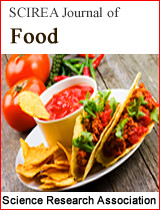Analysis on different grades of highly-rated Jamaica Blue Mountain coffees compared to easily available originated coffee beans
DOI: 385 Downloads 13817 Views
Author(s)
Abstract
Abstract Origin and coffee grades are major factors determining the price of coffee beans. Jamaica Blue Mountain coffee achieves among the highest prices in coffee trading due to its assumed high quality. In this contribution we show the first chemical composition analysis of Jamaica Blue Mountain using LC-MS methods. In particular differences in chlorogenic acid regioisomer distribution were observed for Jamaica Blue Mountain coffee if compared to reference coffees sheding light on the chemical basis of grading systems in coffee.
Keywords
Coffee, chlorogenic acids, polyphenols, LC-MS
Cite this paper
Seung-Hun Lee, Rakesh Jaiswal, Nikolai Kuhnert,
Analysis on different grades of highly-rated Jamaica Blue Mountain coffees compared to easily available originated coffee beans
, SCIREA Journal of Food.
Volume 1, Issue 2, December 2016 | PP. 15-27.
References
| [ 1 ] | Lucon Wagemaker, T.A.; Limonta Carvalho, C.R.; Maia, N.B.; Baggio, S.R.; Guerreiro Filho, O. Sun protection factor, content and composition of lipid fraction of green coffee beans. Industrial Crops and Products 2011, 33, 469-473. |
| [ 2 ] | Kuhnert, N.; Jaiswal, R.; Eravuchira, P.; El-Abassy, R.M.; von der Kammer, B.; Materny, A. Scope and limitations of principal component analysis of high resolution LC-TOF-MS data: the analysis of the chlorogenic acid fraction in green coffee beans as a case study. Analytical Methods 2011, 3, 144-155. |
| [ 3 ] | Balyaya, K.J.; Clifford, M.N. Chlorogenic acids and caffeine contents of monosooned Indian Arabica and Robusta coffees compared with wet and dry processed coffees from the same geographic area. Colloq. Sci. Int. Cafe, [C. R. ] 1995, 16th, 316-325 |
| [ 4 ] | Moon, J.; Yoo, H.S.; Shibamoto, T. Role of Roasting Conditions in the Level of Chlorogenic Acid Content in Coffee Beans: Correlation with Coffee Acidity. J. Agric. Food Chem. 2009, 57, 5365-5369. |
| [ 5 ] | Moon, J.; Shibamoto, T. Role of Roasting Conditions in the Profile of Volatile Flavor Chemicals Formed from Coffee Beans. J. Agric. Food Chem. 2009, 57, 5823-5831. |
| [ 6 ] | Gross, G.; Jaccaud, E.; Huggett, A.C. Analysis of the content of the diterpenes cafestol and kahweol in coffee brews. Food and Chemical Toxicology 1997, 35, 547-554. |
| [ 7 ] | Robinson, D.E.; Mansingh, A. Insecticide contamination of Jamaican environment. IV. Transport of residues from coffee plantations in the blue mountains to coastal waters in eastern Jamaica. Environ. Monit. Assess. 1999, 54, 125-141. |
| [ 8 ] | Weckerle, B.; Richling, E.; Heinrich, S.; Schreier, P. Origin assessment of green coffee (Coffea arabica) by multi-element stable isotope analysis of caffeine. Analytical and Bioanalytical Chemistry 2002, 374, 886-890. |
| [ 9 ] | Parras, P.; Martinez-Tome, M.; Jimenez, A.M.; Murcia, M.A. Antioxidant capacity of coffees of several origins brewed following three different procedures. Food Chem. 2007, 102, 582-592. |
| [ 10 ] | Clifford, M.N.; Johnston, K.L.; Knight, S.; Kuhnert, N. Hierarchical scheme for LC-MSn identification of chlorogenic acids. J. Agric. Food Chem. 2003, 51, 2900-2911. |
| [ 11 ] | Jaiswal, R.; Patras, M.A.; Eravuchira, P.J.; Kuhnert, N. Profile and Characterization of the Chlorogenic Acids in Green Robusta Coffee Beans by LC-MSn: Identification of Seven New Classes of Compounds. J. Agric. Food Chem. 2010, 58, 8722-8737. |
| [ 12 ] | Jaiswal, R.; Matei, M.F.; Golon, A.; Witt, M.; Kuhnert, N. Understanding the fate of chlorogenic acids in coffee roasting using mass spectrometry based targeted and non-targeted analytical strategies. Food & Function 2012, 3, 976-984. |
| [ 13 ] | Clifford, M.N.; Knight, S.; Kuhnert, N. Discriminating between the six isomers of dicaffeoylquinic acid by LC-MSn. J. Agric. Food Chem. 2005, 53, 3821-3832. |
| [ 14 ] | Frank, O.; Zehentbauer, G.; Hofmann, T. Bioresponse-guided decomposition of roast coffee beverage and identification of key bitter taste compounds. European Food Research and Technology 2006, 222, 492-508. |
| [ 15 ] | Dunkel, A.; Steinhaus, M.; Kotthoff, M.; Nowak, B.; Krautwurst, D.; Schieberle, P.; Hofmann, T. Nature's Chemical Signatures in Human Olfaction: A Foodborne Perspective for Future Biotechnology. Angewandte Chemie-International Edition 2014, 53, 7124-7143. |

